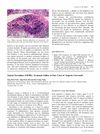Peripheral Blood Gene Expression in Alopecia Areata Reveals Molecular Pathways Distinguishing Heritability, Disease, and Severity
June 2010
in “
Genes and Immunity
”

TLDR Blood tests can help understand the genetic differences in people with alopecia areata, including how severe it is and if it's inherited.
The study analyzed gene expression in the blood of 18 individuals, including 9 patients with alopecia areata (AA), 5 unaffected relatives, and 4 unrelated healthy controls, to understand the molecular pathways involved in AA. Researchers found 167 differentially expressed genes associated with immune response and identified three distinct expression patterns related to heritability, disease presence, and severity. The study revealed upregulation in genes linked to immune system processes, apoptosis, and G-protein signal transduction, suggesting the involvement of both innate and adaptive immune processes in AA. Shared genes between AA blood and skin lesions suggest that blood may contain biomarkers for AA. This research indicates that peripheral blood gene expression profiling can aid in the molecular classification of AA and the identification of system-wide disturbances related to the disease. However, larger studies are needed to validate these findings and their potential use in diagnosis, prognosis, and treatment.









